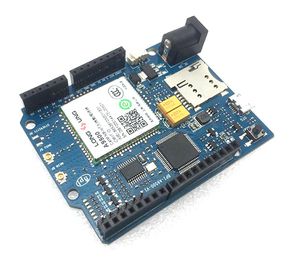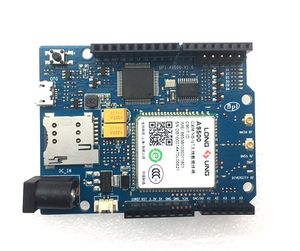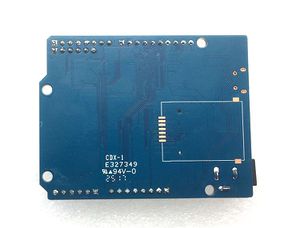|
|
| (15 intermediate revisions by the same user not shown) |
| Line 1: |
Line 1: |
| | =Introduction= | | =Introduction= |
| | | | |
| − | [[File:BPI-GSM_3.JPG|thumb|Overview]] | + | [[File:BPI_NB-IoT_arduino_1.JPG|thumb|Overview]] |
| − | [[File:BPI-GSM_7.JPG|thumb|Overview]] | + | [[File:BPI_NB-IoT_arduino_5.JPG|thumb|Overview:front]] |
| | + | [[File:BPI_NB-IoT_arduino_6.JPG|thumb|Overview:back]] |
| | | | |
| − | BPI NB-IoT development board ,also can use with arduino ,all design with low power consumption
| |
| | | | |
| − | application of IOT network module, integrated with BC95 module, STM8L152C8U6 master, the low power consumption, battery life can be improved to at least 10 years, supports various protocols of sensor, more adaptable to the application of P a variety of scenarios that can be used for wireless meter reading, wisdom city, security, asset tracking, intelligent home appliances, agricultural and environmental monitoring and other industries, to provide complete text messages and data transmission services.Also compatible with the arduino, let you in the process of debugging easier
| + | BPI NB-IoT Arduino development board with Qualcomm chip design |
| | | | |
| | == Key Features == | | == Key Features == |
| − |
| |
| − | * photocell: measuring the current light luminance;
| |
| − | * high precision temperature&humidity sensor: measure current temperature and relative humidity
| |
| − | * GSM module: can be used to make phone call, text,2G connectivity,GPS positioning.
| |
| − | * Developed on Arduino, with the main chip:2560,communicate with Arduino using AT command
| |
| − | * support powered by battery.
| |
| | | | |
| | =Hardware= | | =Hardware= |
| Line 20: |
Line 14: |
| | == Hardware Spec== | | == Hardware Spec== |
| | | | |
| − | *Working frequency: 850 MHZ
| + | |
| − | *Size: 53 X 43 mm
| |
| − | *Power supply: 3.8 V battery power supply or micro - USB interface power supply (5 V)
| |
| − | *Operating temperature range: to 40 ° C to + 85 ° C
| |
| − | *Output power: 23 DBM
| |
| − | *Sensitivity: - 135 DBM
| |
| − | Power consumption: Sleep: < 20 ua
| |
| − | *Download: SWD
| |
| − | *The AT command control: 3 GPP Rel - 13, and enhanced the AT command
| |
| | | | |
| | ==BPI-GSM sketch map == | | ==BPI-GSM sketch map == |
| | | | |
| − | [[File:BPI-GSM_sketch_map.JPG]]
| |
| | | | |
| − | =Software=
| |
| | | | |
| − | ==How to use BPI-GSM module== | + | == GPIO Pin define == |
| − | test code download:https://drive.google.com/file/d/0B4PAo2nW2KfnOWxXeTdkWlY0c2c/view?usp=sharing
| |
| | | | |
| − | Please use arduino 1.6.6 Ver IDE,if you know arduino,it is easy to use.
| |
| | | | |
| − | [[File:Use_1.JPG]]
| |
| | | | |
| − | [[File:Use_2.JPG]]
| + | =Software= |
| − | | |
| − | [[File:Use_3.JPG]]
| |
| − | | |
| − | [[File:Use_4.JPG]]
| |
| | | | |
| − | [[File:Use_5.JPG]]
| |
| | | | |
| − | ==SIM808 module==
| |
| − |
| |
| − | S
| |
| − | IM808 module is a complete Quad-Band GSM/GPRS module which combines GPS technology for satellite
| |
| − |
| |
| − | navigation. The compact design which integrated GPRS and GPS in a SMT package will significantly save both time and costs for customers to develop GPS enabled applications. Featuring an industry-standard interface and GPS function, it
| |
| − | allows variable assets to be tracked seamlessly at any location and anytime with signal coverage.
| |
| − |
| |
| − | General features:
| |
| − |
| |
| − | * Quad-band 850/900/1800/1900MHz
| |
| − | * GPRS multi-slot class 12/10
| |
| − | * GPRS mobile station class B
| |
| − | * Compliant to GSM phase 2/2+
| |
| − | – Class 4 (2 W @ 850/900MHz)
| |
| − | – Class 1 (1 W @ 1800/1900MHz)
| |
| − | * Bluetooth: compliant with 3.0+EDR
| |
| − | * Dimensions: 24*24*3mm
| |
| − | * Weight: TBD
| |
| − | * Control via AT commands (3GPP TS 27.007,27.005 and SIMCOM enhanced AT Commands)
| |
| − | * Supply voltage range 3.4 ~ 4.4V
| |
| − | * Low power consumption
| |
| − | * Operation temperature:-40℃ ~85℃
| |
| − |
| |
| − | Specifications for GPRS Data:
| |
| − | * GPRS class 12: max. 85.6 kbps (downlink/uplink)
| |
| − | * PBCCH support
| |
| − | * Coding schemes CS 1, 2, 3, 4
| |
| − | * PPP-stack
| |
| − | * CSD up to 14.4 kbps
| |
| − | * USSD
| |
| − | * Non transparent mode
| |
| − |
| |
| − | Specifications for SMS via GSM/GPRS:
| |
| − | * Point to point MO and MT
| |
| − | * SMS cell broadcast
| |
| − | * Text and PDU mode
| |
| − |
| |
| − | Software features:
| |
| − | * 0710 MUX protocol
| |
| − | * Embedded TCP/UDP protocol
| |
| − | * FTP/HTTP
| |
| − | * MMS
| |
| − | * E-MAIL
| |
| − | * DTMF
| |
| − | * Jamming Detection
| |
| − | * Audio Record
| |
| − | * TTS (optional)
| |
| − | * Embedded AT (optional)
| |
| − |
| |
| − | Compatibility:
| |
| − | * AT cellular command interface
| |
| − |
| |
| − | Interfaces:
| |
| − | * 68 SMT pads including
| |
| − | * Analog audio interface
| |
| − | * PCM interface(optional)
| |
| − | * SPI interface (optional)
| |
| − | * RTC backup
| |
| − | * Serial interface
| |
| − | * USB interface
| |
| − | * Interface to external SIM 3V/1.8V
| |
| − | * Keypad interface
| |
| − | * GPIO
| |
| − | * ADC
| |
| − | * GSM Antenna pad
| |
| − | * Bluetooth Antenna pad
| |
| − | * GPS Antenna pad
| |
| − |
| |
| − | Specification for GPS:
| |
| − | * Receiver type:-22 tracking /66 acquisition -channel,-GPS L1 C/A code
| |
| − | * Sensitivity:-Tracking: -165 dBm,-Cold starts : -148 dBm
| |
| − | * Time-To-First-Fix:-Cold starts: 30s (typ.),-Hot starts: 1s (typ.)
| |
| − | * Accuracy:-Horizontal position : <2.5m CEP
| |
| − | * Power consumption (GSM engine in idle mode):-Acquisition 24mW,-Tracking 17mW
| |
| | | | |
| | =Resources= | | =Resources= |
| − | BPI-GSM module schematic diagram : https://drive.google.com/file/d/0B4PAo2nW2Kfnekg2S0JLaHVxbkU/view?usp=sharing
| |
| − |
| |
| − | Video demo on youtube: https://www.youtube.com/watch?v=ezc8UDYJUBM&feature=youtu.be
| |
| − |
| |
| − | Forum : http://forum.banana-pi.org/c/BPI-Iot-module/GSM-module
| |
| − |
| |
| − | quick to buy sample : http://www.aliexpress.com/store/product/Newest-items-BPI-GSM-Module-for-making-phone-call-text-2G-connectivity-GPS-positioning/302756_1000001448261.html
| |


